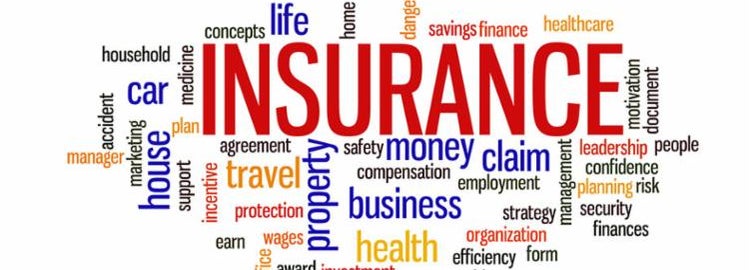Confusing Insurance Terms Finally Explained

Most people have several different types of insurance policies throughout their lives. The most common kinds of insurance include car, home, life and umbrella insurance. We know we need them, but do we know exactly why these policies are necessary and how they work? Knowing the definition of insurance and the various types can help policy holders make better decisions regarding which policy to buy.
The official definition of insurance is a practice or arrangement by which a company or government agency provides a guarantee of compensation for specified loss, damage, illness, or death in return for payment of a premium. It provides protection against a possible eventuality. So how does this definition apply to the most common insurance policies in today's world.
All You Need to Know about Car Insurance
Rather than paying a large sum to repair our vehicles following a crash, we purchase car insurance for a much smaller fee called a premium. The definition of car insurance is an agreement that if you pay the premium, the insurance company will help pay to repair or replace your vehicle. It can also help pay for medical treatment if any injuries are a result of the crash. Many car insurance policies also cover repairs for damages due to bad weather, fire, burglary or theft.
Two Main Types of Car Insurance Defined
There are two main types of car insurance: liability-only and comprehensive coverage. Most states in the U.S. require drivers to purchase a minimum level of liability coverage. This form of car insurance will help pay for repairs or medical treatment if you injure another motorist or damage their vehicle. Comprehensive coverage will help pay to repair or replace your vehicle following an accident, fire, extreme weather event, burglary or theft. Comprehensive car insurance will also help pay for the treatment of any injuries resulting from an accident.
How Car Insurance Works in the Real World
Say you hit another vehicle while driving and both cars are damaged. The other driver also broke an arm in the crash. If you have liability-only car insurance, the insurance company will help pay for the other driver's repairs and medical treatment. If you have comprehensive car insurance, the repairs to both vehicles will be covered as well as any medical care.
What Affects Car Insurance Costs?
The cost of your car insurance premiums depends on a number of factors, including:
- Your age, gender and driving history
- The type and value of the vehicle you drive
- How you use your vehicle
- Where you drive and store your vehicle
Homeowners Insurance Defined
Just as you do not want to pay out of pocket for the expenses of a car accident, neither do you want to absorb the entire costs in the event your home is seriously damaged. If you took out a mortgage to pay for your property, most lenders require that you purchase homeowners insurance.
The definition of homeowners insurance is a policy that helps repair or replace your home if it is damaged or ruined in a fire, burglary, and most extreme weather events. It can also help pay for your legal defense if someone is injured on your property and sues you for payment.
What Does Home Insurance Cover?
There are two main components of a homeowners insurance policy: building coverage and contents coverage. The first covers your home itself -- the walls, flooring, roof, electrical system, plumbing, etc. The second covers what you have in the home -- furniture, electronics, appliances, clothing, art, jewelry, etc. You can choose to purchase contents coverage at either replacement cost or actual cash value.
How Home Insurance Helps
If your home is damaged by a fire. According to the National Fire Safety Council, most people will experience a home fire every five years. Your homeowners insurance will help repair or replace both the structure if it is damaged and any personal property affected by the blaze. You will pay for the costs of repairs up to your deductible, and the insurance company will pay the rest.
Say your washer and dryer are damaged in a fire. If you have replacement cost coverage, the insurance company will pay to replace your laundry equipment with brand new machines of comparable features. If you have actual cash value coverage, the insurance company will pay you whatever the machines were worth at the time of the fire. If the appliances are fairly old, this form of home insurance may not benefit you much.
While any damages resulting from a tornado are covered under a traditional homeowners insurance policy, there are some weather-related exemptions. Floods and earthquakes are not covered by home insurance, but you can purchase separate policies or add riders to your existing policy to cover these possibilities. If you live in an area prone to floods or earthquakes, your lender may require that you include this coverage in your policy.
What Affects the Price of Home Insurance?
The cost of your home insurance policy depends on several factors, including:
- The value of your home
- Where your home is located
- The coverage options you choose
- Whether you have things like a fireplace, trampoline, dogs and teenagers (yes, teens can increase your premiums!)
Breaking Down Life Insurance
After learning the benefits of having car and home insurance, most people start to consider purchasing a life insurance policy. Many people begin to think about life insurance after marriage or starting a family. Life insurance, by definition, is a policy that helps your beneficiaries pay for your end of life expenses or continue to pay the bills after you're gone.
The Definitions of Whole and Term Life Insurance
There are two main types of life insurance: whole and term.
Term life insurance is the easiest and most affordable form and is defined by the following features:
- Pays death benefits.
- Pays benefits if you die during the term of the policy.
- Covers you for a specific time period, or "term" of 5, 10, 15 years or more.
- Becomes more expensive as you age.
- The term can be renewed if you want to extend the coverage.
- Can be used to supplement whole life insurance.
- Can be converted to whole life insurance.
Whole, or permanent, life insurance is more complicated. There are numerous forms of whole life insurance, each with their own features and stipulations. In general, however, whole life insurance policies are defined by the following features:
- Covers you for life.
- Provides death benefits as well as a cash value accumulation that builds during the life of the policy.
- You commonly must qualify with a health examination.
- Can be purchased without a medical exam, but at a higher cost.
- Takes up to 15 years to build up sizeable cash value.
- Can be a tool used in estate planning.
- Cash value is based on how much the return on investment is worth.
- A portion of the cash value can typically be withdrawn or borrowed during the life of the policy.
Examples of Life Insurance Policies
The type of life insurance you may want to consider is a personal choice and should depend on your goals for the policy. If you are newly married, are relatively young and have no dependents, you may want to opt for a term policy, especially if your spouse earns their own income. A term life insurance policy will ensure that your spouse won't have to worry about your burial expenses. A robust term policy may even help them continue making payments on the mortgage for several months while they grieve.
A person in their 50s with a spouse and teenage children may want to consider a whole life insurance policy. Perhaps the spouse has stayed at home with the kids. One goal of life insurance is to make sure they can continue paying the bills after the income earner has died. Maybe the cash value accumulated is intended to help pay for the children's college educations.
What Factors Determine the Cost of Life Insurance?
Now that you know the definition of the two main types of life insurance, you may be wondering about the cost. In general, the price tag of your life insurance policy will depend on:
- The type of policy you choose (whole vs. term)
- Your age
- Your health
- Whether your employer helps pay the premiums or you purchase an individual policy
Take a Look Under the Umbrella
Umbrella insurance is a type of policy that many people don't know much about, but may wish they had when it comes time to file a claim on any of their other policies.
Your primary insurance coverage, such as your homeowners and auto policies, includes liability coverage up to a certain limit. Liability is your legal responsibility to pay for damage to a person or to a person’s property. The definition of umbrella insurance is a policy that significantly increases your liability coverage. You may be surprised at how little the premiums can be for a $1 million umbrella policy.
Why Is Umbrella Insurance Important?
Umbrella insurance can also cover events that are typically excluded from your primary policies. Your homeowners insurance liability policy most likely does not cover claims resulting from false arrest, libel, slander, or defamation of character. If you are held liable for damages caused by these types of claims, the umbrella policy can help pay your attorney fees and court costs.
We live in a litigious society, which is causing more and more people to obtain the benefits of an umbrella insurance policy. If you have substantial assets to protect, that can unfortunately paint a target on your back. An umbrella policy can help protect you in the event of legal claims against you. So how does it work?
Bringing the Definition of Umbrella Insurance to Life
Let's say you are involved in a car accident. Your car insurance liability coverage is limited to $200,000. That may seem high, but with medical costs increasing every year, one serious injury -- or several injuries if the crash was severe -- can quickly eat up that limit. Your car insurance will pay out its liability portion and your umbrella policy will pick up the rest, ensuring you do not pay out of pocket for an expensive liability claim.
Put Your New Insurance Knowledge to Work
Now that you know a little more about the various insurance policies that most people will purchase at some point, you may have more questions or you may be ready to jump into the insurance pool yourself. Knowledgeable independent insurance agents with Trusted Choice® are always available to answer any questions you may have. These experienced agents can help you navigate the various policy options and assist you with locating several quotes from a variety of insurance companies, ensuring the policy you choose offers the best coverage at the most affordable rates. Contact a Trusted Choice agent near you to find out more about how these common insurance policies can help protect you and those you love.
